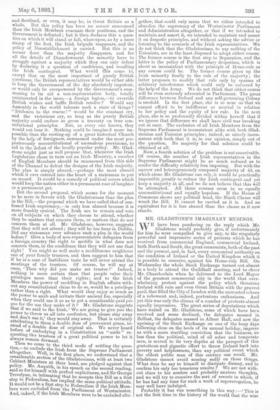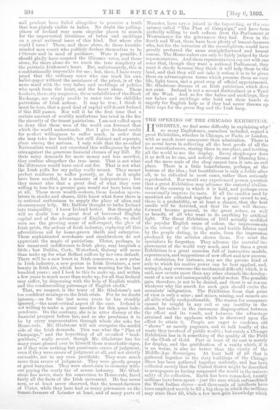GLADSTONE'S IMAGINARY MUSINGS.
WE have been pondering on the reply which Mr. Gladstone would probably give, if unfortunately for him he were compelled to give any, to the singularly powerful and impressive series of protests which he has received from commercial England, commercial Ireland, both North and South, the great economists, both of the past and the present, and, in fact, every economical authority on the condition of Ireland or the United Kingdom which it is possible to conceive, against his Home-rule Bill. On Wednesday the whole Stock Exchange turned out almost in a body to attend the Guildhall meeting, and to cheer Mr. Chamberlain when he delivered to the Lord Mayor of the greatest commercial city in the world that over- whelming protest against the policy which threatens Ireland with ruin and even Great Britain with the gravest peril, that filled the City of London with the unwonted echoes of a vehement and, indeed, portentous enthusiasm. And yet this was only the climax of a number of protests almost equally impressive. The great series of deputations which have waited on Mr. Gladstone, some of which have been received and some declined, the delegates massed in Belfast, the delegates massed in Albert Hall, and now the uprising of the Stock Exchange on one of the busy days following close on the heels of its annual holiday, impress us with a more startling conviction that the business, no less than the political, mind of all sober and temperate men, is moved to its very depths at the prospect of this. gratuitous and gigantic effort to throw Ireland back into poverty and helplessness, than any political event which the oldest public man of this century can recall.Mr. Gladstone cannot avoid musing sadly on these things. What does he say to himself to dissipate dismay, and to confirm his only too tenacious resolve ? We are not with- out clues to his sombre and probably anxious thoughts, and we will try to conceive the sort of reverie in which, if he has had any time for such a work of supererogation, he may well have indulged. Probably it has run something in this way This is not the first time in the history of the world that the wise and prudent have failed altogether to perceive a truth that was plainly visible to babes. No doubt the polling- places of Ireland may seem singular places to search tor the unperverted intuitions of babes and sucklings on a great national issue of this kind. But where else could I turn ? There, and there alone, do those humble- minded men resort who publicly declare themselves to be i'literate and in need of guidance. Were it possible, I should gladly have counted the illiterate votes, and those alone, for there alone do we reach the true simplicity of the patriotic Irishman's heart. But, unfortunately, this is c mstitutionally impossible for me ; but, then, I have every proof that the ordinary voter who can mark his own ballot-paper without the assistance of the priest, is of the same mind with the very babes and sucklings of polities who speak from the heart, and the heart alone. These I:sulkers, these city magnates, these notabilities of the Stock Exchange, are simply unable to enter into the childlike patriotism of Irish ardour. It may be true, I think it must be true, that a good deal of capital will desert Ireland if this Bill passes. Nor will it be the first time that a certain amount of worldly misfortune has tried in the fire the sincerity of the truest patriotism. I am not called upon to deny that these men of the world can forecast that which the world understands. But I give Ireland credit for perfect willingness to suffer much, in order that she may take her humble, but still distinct and separate, place among the nations. I only wish that the so-called Nationalists would not overcloud this willingness by their tries against the generous financial clauses of my Bill. By their noisy demands for more money and less sacrifice, they confuse altogether the true issue. That is not what the illiterates would have cried out for. That is not what the Irish polls for my policy really meant. They meant perfect readiness to suffer poverty, so far as it might have been needful, for a measure of independence ; but they meant also that a great deal of what they were willing to lose for a greater gain would not have been lost at all. These mere wealth-seekers, these London specu- lators in stocks and shares, little know what force there is in national enthusiasm to supply the place of alien and eleemosynary help. Mr. Balfour thought to bribe Ireland into tranquillity. I know Ireland better. But though she will no doubt lose a great deal of borrowed English capital and of the advantage of English credit, we shall soon see the growing sense of self-respect, the glow of Irish pride, the ardour of Irish industry, replacing all this adventitious aid by home-grown thrift and enterprise. These sophisticated merchants and stockbrokers do not appreciate the magic of patriotism. -Ulster, perhaps, in her unnatural indifference to Irish glory, may languish a little ; but Dublin, Cork, Waterford, Galway will more than make up for what Belfast suffers by her own default. There will be a new heart in Irish commerce, a new pulse in Irish industry, a new genius in Irish literature, a new beauty in Irish art, which have been wanting for the last hundred years ; and I look to this to make up, and within a few years to much more than make up, for all that Ireland may suffer, by dispensing with the help of English wealth and the condescending patronage of English credit.' That, we suspect, is the tenor of Mr. Gladstone's not too confident musings on the Irish crisis. For he no doubt ignores,—as for the last seven years he has steadily ignored,—the most critical aspect of the case. Ireland is not willing to make a great sacrifice for this quasi inde- pendence. On the contrary, she is in utter dismay at the financial prospect before her, and so she proclaims it to be by every representative through whom she asks for Home-rule. Mr. Gladstone will not recognise the sordid side of the Irish demands. This was what the "Plan of Campaign," and the boycotting of all so-called "land- grabbers," really meant, though Mr. Gladstone has for many years glossed over to himself these remarkable signs, as if they were nothing but passionate errors of judgment, even if they were errors of judgment at all, and not strictly excusable, not to say even justifiable. They were much more than errors of judgment. They were greedy grasps at good bargains. They were short-cuts to economy with- out paying the costly tax of severe industry. Mr. Glad- stone has never, since his conversion to Home-rule, faced fairly all the facts of the Irish movement. He has never seen, or at least never observed, that the tenant-farmers of Ulster, while they have had as many grievances as the tenant-farmers of Leinster at least, and of many parts of Munster, have neva joined in the boycotting, or the con- spiracy called "The Plan of Campaign," and have been perfectly willing to seek redress from the Parliament at Westminster for the grievances they had. Even in the South and West, there have been plenty of tenant-farmers who, but for the terrorism of the moonlighters, would have greatly preferred the same straightforward and honest course. The Home-rulers can only be fairly judged by their representatives. And these representatives cry out with one voice that, though they want a national Parliament, they want it chiefly because they think it will help them to the land, and that they will not take it unless it is to be given them on advantageous terms which promise them an easy life, light taxes, and a great crop of official appointments. Mr. Gladstone dreams of an Irish patriotism which does not exist. Ireland is not a second Switzerland or a Tyrol of the 'West. And as for the babes and sucklings, they are babes and sucklings who hold out their hands as eagerly for English help as if they had never thrown up their caps for the green flag and the Irish harp.







































 Previous page
Previous page